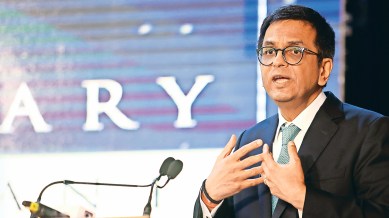Stay updated with the latest - Click here to follow us on Instagram
Indian judiciary has shifted to facilitating arbitration: CJI in UK
CJI Chandrachud was delivering a lecture on the rise of commercial arbitration in India and the UK at the Supreme Court of the United Kingdom on June 6.

The Indian judiciary has moved from a regime of judicial interference with arbitration to facilitating arbitration, Chief Justice of India (CJI) D Y Chandrachud said Thursday.
“Imposing courtrooms designed to bear the insignia of the sovereign power of the State are being replaced by swanky meeting rooms where parties engage in dialogues over complex commercial matters,” he said.
monthly limit of free stories.
with an Express account.
CJI Chandrachud was delivering a lecture on the rise of commercial arbitration in India and the UK at the Supreme Court of the United Kingdom on June 6.
Acknowledging that arbitration through official institutions in India is still in its early stages, the CJI said that the culture of arbitration and mediation has existed for centuries as “a system of dispute settlement by village elders”.
He said that arbitration is no longer an “alternative” form of dispute resolution. “It is in fact the preferred method of seeking commercial justice,” he said.
However, he said, commercial arbitration is not immune from deficiencies such as “delay, cost, judicial interference, arbitrator bias, and lack of enforceability of awards”.
On the minimal court interference, the CJI said that courts intervene in international arbitration when parties do not mutually agree on arbitrators. Then, as per Section 11 of the Arbitration and Conciliation Act, the Supreme Court appoints arbitrators but only after ascertaining whether there is a valid arbitration agreement in the first place.
The CJI underscored how legislative amendments to minimise the court’s role in appointing arbitrators are still in the pipeline.
“In 2019, amendments have been introduced to the Arbitration Act empowering the Supreme Court and the High Courts to designate arbitral institutions who will carry out the appointments. However, these amendments are yet to be given complete effect by the legislature, and for the time being, parties to an international commercial arbitration agreement have to approach the Supreme Court for appointment of arbitrators where there is a refusal by the other party,” CJI said.
A 2016 amendment also attempted to limit the scope of the intervention of the referral court at the stage of the appointment of an arbitrator to a minimum. An amendment to Section 11 clarified that the nature of inquiry by the referral court under Section 11 should be confined to the “examination of the existence of an arbitration agreement.”